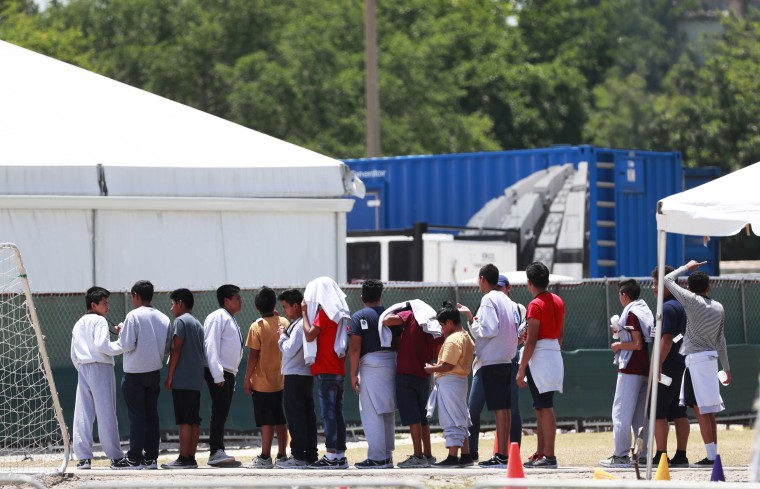WASHINGTON —The Biden administration's task force to reunify migrant families separated by the Trump administration falls short of what many advocates say they had hoped would be special protections given to all families affected by "zero tolerance" and its pilot programs, even those who accepted deportation in order to be reunified.
The task force, which will be established through an executive order Biden signed Tuesday afternoon, will only look only at families still separated, a White House official told NBC News.
That excludes families who chose deportation to a country they originally decided to flee in order to reunite. Lawyers for the families had argued that as victims of the separation policy, they should be allowed special protections to return to the U.S. to seek asylum.
Lee Gelernt, deputy director of ACLU's Immigrants' Rights Project and one of the lawyers leading the federal lawsuit on behalf of the separated families, said the task force's mission does not go far enough.
"We think that any family that has been subjected to this barbaric policy must be given safety in the U.S., permanent legal status and restitution. The fact that a family is now reunited does not eliminate the trauma it has already endured," Gelernt said.
Biden's executive order establishing the reunification task force and the other two orders on immigration signed Tuesday are limited by design, said a person familiar with the drafting of the orders.
The new administration worried that going too far would send the message to would-be immigrants to come to the United States and create legal challenges, the person familiar with the drafting said.
Another person familiar with the discussions about the executive orders said each has been subjected to rigorous legal review to ward off court challenges and injunctions.
Many executive orders by former President Donald Trump, including his January 2017 travel ban from majority-Muslim countries, caused chaos and were ultimately stopped by courts. So far, the only immigration executive order signed by Biden that has been challenged in court is his 100-day moratorium on deportations.
The two other orders, regarding the asylum process and access to benefits for legal migrants, largely promised to "review" Trump policies. For example, the secretary of the Department of Homeland Security will be directed to review the Migrant Protection Protocols, known as "Remain in Mexico," according to a fact sheet provided by the White House. That policy has kept tens of thousands of asylum seekers waiting in northern Mexico for their chance to make a case for protection in the United States.
Noah Gottschalk, leader of global policy for Oxfam America, urged the Biden administration to completely rescind the policy.
"For the tens of thousands of people forced into limbo by the Trump administration's cruel, xenophobic policies, the results of President Biden's policy review cannot come soon enough. We urge President Biden to completely rescind the policies — like 'Remain in Mexico' — that continue to separate families and harm so many," Gottschalk said.
Alida Garcia, vice president of FWD.US, an immigration advocacy group founded by tech and business industry leaders, said that while the Biden administration's announcements are "welcome and transformative news, the humanitarian crisis has not changed at the border"
"There is a tremendous amount of urgent work to fix a long failed immigration system,” said “Fixing the Trump-manufactured humanitarian crisis begins with urgently providing clarity to the children and adults in Migrant Protection Protocols (MPP) — a cruel Trump-era program that forced over 65,000 migrants and children fleeing violence and persecution to wait in Mexico for a chance to obtain protection and seek asylum in the United States. Each day that passes is a day that the United States is keeping them at risk."
Also on Tuesday, over 100 immigrant rights organization wrote a letter to DHS urging the department to halt deportation on five migrant families who could be flown back to their home countries as soon as Thursday. The lawyers said the families, some of whom include children as young as three, do not fit the enforcement priorities laid out by Biden's acting DHS Secretary David Pekoske. Despite a federal judge temporarily blocking the 100-day moratorium on deportations, the lawyers said, those enforcement priorities went into effect on Wednesday and should allow these families to stay in the U.S.
"These parents and their children, some as young as three years old, face deportation to the countries from which they are seeking asylum after the prior administration sought to deny them protection based on unlawful and anti-refugee policies, such as the Third Country Asylum Transit Ban. Despite federal courts ruling the underlying policies were unlawful, these families have remained detained for up to 18 months and now face return to harm," the letter, signed by 110 organizations, said.
Guidance sent from DHS to Immigration and Customs Enforcement field officers since Biden’s inauguration does not include any language that explicitly protects families who have final orders of removal, meaning a court has ordered they be sent back to their home countries, from deportation.
“U.S. Immigration and Customs Enforcement (ICE) is now implementing the civil immigration enforcement priorities directed by the U.S. Department of Homeland Security (DHS) on Jan. 20, to focus its limited resources on threats to national security, border security and public safety,” an ICE spokesperson said. “ICE will continue to carry out is duty to enforce the laws of the United States in accordance with the Department’s national security and public safety mission.”





